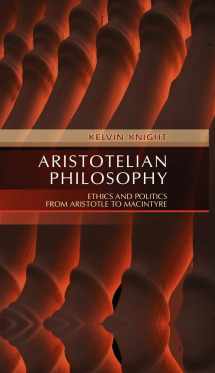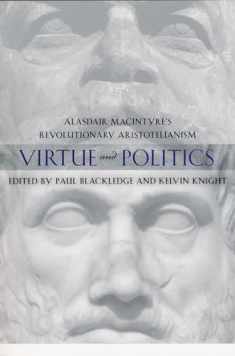
Aristotelian Philosophy: Ethics & Politics from Aristotle to MacIntyre
ISBN-13:
9780745619774
ISBN-10:
0745619770
Edition:
1
Author:
Kelvin Knight
Publication date:
2007
Publisher:
Polity
Format:
Paperback
256 pages
Category:
Ethics & Morality
,
Philosophy
FREE US shipping
Book details
ISBN-13:
9780745619774
ISBN-10:
0745619770
Edition:
1
Author:
Kelvin Knight
Publication date:
2007
Publisher:
Polity
Format:
Paperback
256 pages
Category:
Ethics & Morality
,
Philosophy
Summary
Aristotelian Philosophy: Ethics & Politics from Aristotle to MacIntyre (ISBN-13: 9780745619774 and ISBN-10: 0745619770), written by authors
Kelvin Knight, was published by Polity in 2007.
With an overall rating of 4.1 stars, it's a notable title among other
Ethics & Morality
(Philosophy) books. You can easily purchase or rent Aristotelian Philosophy: Ethics & Politics from Aristotle to MacIntyre (Paperback) from BooksRun,
along with many other new and used
Ethics & Morality
books
and textbooks.
And, if you're looking to sell your copy, our current buyback offer is $0.3.
Description
Aristotle is the most influential philosopher of practice, and Knight's new book explores the continuing importance of Aristotelian philosophy. First, it examines the theoretical bases of what Aristotle said about ethical, political and productive activity. It then traces ideas of practice through such figures as St Paul, Luther, Hegel, Heidegger and recent Aristotelian philosophers, and evaluates Alasdair MacIntyre's contribution. Knight argues that, whereas Aristotle's own thought legitimated oppression, MacIntyre's revision of Aristotelianism separates ethical excellence from social elitism and justifies resistance. With MacIntyre, Aristotelianism becomes revolutionary. MacIntyre's case for the Thomistic Aristotelian tradition originates in his attempt to elaborate a Marxist ethics informed by analytic philosophy. He analyses social practices in teleological terms, opposing them to capitalist institutions and arguing for the cooperative defence of our moral agency. In condensing these ideas, Knight advances a theoretical argument for the reformation of Aristotelianism and an ethical argument for social change.


We would LOVE it if you could help us and other readers by reviewing the book
Book review

Congratulations! We have received your book review.
{user}
{createdAt}
by {truncated_author}



